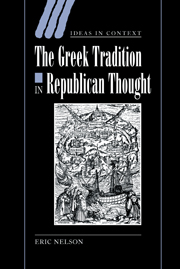Book contents
- Frontmatter
- Contents
- Acknowledgments
- Note on conventions
- Introduction
- 1 Greek nonsense in More's Utopia
- 2 The Roman agrarian laws and Machiavelli's modi privati
- 3 James Harrington and the “balance of justice”
- 4 “Prolem cum matre creatam”: the background to Montesquieu
- 5 Montesquieu's Greek republics
- 6 The Greek tradition and the American Founding
- Coda: Tocqueville and the Greeks
- Bibliography
- Index
- IDEAS IN CONTEXT
6 - The Greek tradition and the American Founding
Published online by Cambridge University Press: 22 September 2009
- Frontmatter
- Contents
- Acknowledgments
- Note on conventions
- Introduction
- 1 Greek nonsense in More's Utopia
- 2 The Roman agrarian laws and Machiavelli's modi privati
- 3 James Harrington and the “balance of justice”
- 4 “Prolem cum matre creatam”: the background to Montesquieu
- 5 Montesquieu's Greek republics
- 6 The Greek tradition and the American Founding
- Coda: Tocqueville and the Greeks
- Bibliography
- Index
- IDEAS IN CONTEXT
Summary
Taking the story of the Greek tradition forward into the period of the American Founding necessarily involves an intervention in one of the most vitriolic historiographical debates of the last thirty years. Beginning with the release of Bernard Bailyn's Ideological Origins of the American Revolution (1967) and Gordon S. Wood's Creation of the American Republic (1969), a distinguished group of American historians began to question the scholarly consensus that had placed the political theory of John Locke at the center of American revolutionary and constitutional thought. These historians stressed instead the reliance of the Founders on eighteenth-century British opposition writers and, by implication, on the “classical republicanism” sketched out in the postwar period by Zera Fink and Caroline Robbins. The new “republican synthesis,” as Robert Shalhope dubbed it in 1972, received perhaps its most crucial defense from J. G. A. Pocock's The Machiavellian Moment (1975), which, as we have seen, presents the American Revolution as the apotheosis of a tradition of republican thought stretching back to the writings of Aristotle and Polybius. The controversy generated by this new wave of republican historiography has been very extensive. Literally dozens of historians on both sides of the Atlantic have responded to Pocock and his followers by attempting to reclaim center stage for Locke and “liberalism.” After decades of conflict, however, it has become increasingly clear to a new generation of historians that Locke's influence in eighteenth-century America is unlikely to have been either complete or completely absent, and, accordingly, these younger scholars have advocated a rapprochement between the two warring factions based on mutual recognition of the complexity and heterogeneity of the intellectual landscape at the Founding.
- Type
- Chapter
- Information
- The Greek Tradition in Republican Thought , pp. 195 - 233Publisher: Cambridge University PressPrint publication year: 2004

